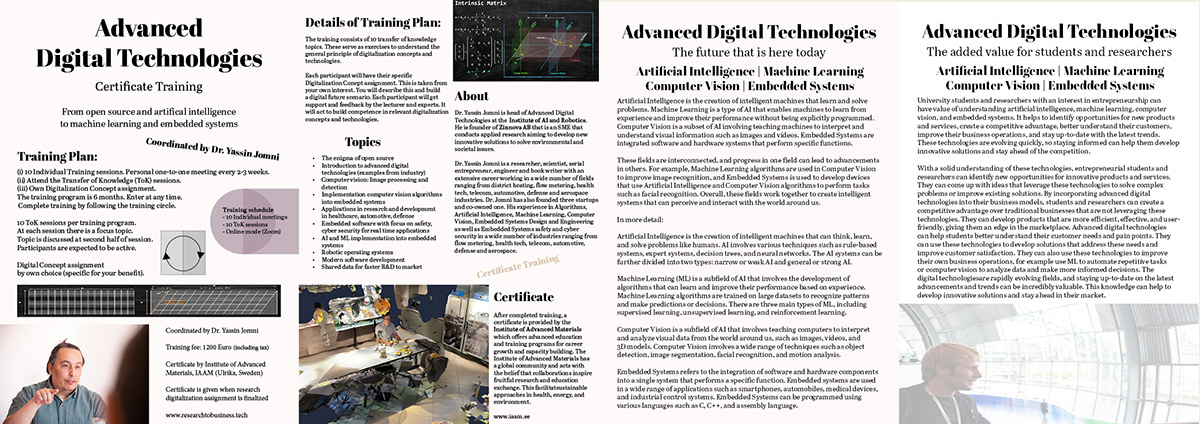Certificate course: Advanced Digital Technologies
Course responsible: Yassin Yomni, Zinnova AB
For universities and organizations with interest in R&D and digitalization. Minimum 10 participants.
University students and researchers with an interest in entrepreneurship can have value of understanding artificial intelligence, machine learning, computer vision, and embedded systems. It helps to identify opportunities for new products and services, create a competitive advantage, better understand their customers, improve their business operations, and stay up-to-date with the latest trends. These technologies are evolving quickly, so staying informed can help them develop innovative solutions and stay ahead of the competition.
Artificial Intelligence is the creation of intelligent machines that learn and solve problems. Machine Learning is a type of AI that enables machines to learn from experience and improve their performance without being explicitly programmed. Computer Vision is a subset of AI involving teaching machines to interpret and understand visual information such as images and videos. Embedded Systems are integrated software and hardware systems that perform specific functions.
With a solid understanding of these technologies, entrepreneurial students and researchers can identify new opportunities for innovative products and services.
The training program is 6 months.
Course fee per participant: 320 EUR. Certificate by ICM Research Institute.
Training Plan:
(i) 10 Training sessions (about 2 hr each session).
(ii) Additional sessions about Transfer of Knowledge (ToK).
(iii) Own Digitalization Concept assignment. Personal development by 5 individual meetings.
10 ToK sessions per training program. At each session there is a focus topic. Topic is discussed at second half of session. Participants are expected to be active.
Digital Concept assignment by own choice (specific for your benefit).
Topics:
– The enigma of open source
– Introduction to advanced digital technologies (examples from industry)
– Computer vision: Image processing and detection
– Implementation computer vision algorithms into embedded systems
– Applications in research and development in healthcare, automotive, defense
– Embedded software with focus on safety, cyber security for real time applications
– AI and ML implementation into embedded systems
– Robotic operating systems
– Modern software development
– Shared data for faster R&D to market

Dr. Yassin Jomni is a researcher, scientist, serial entrepreneur, engineer and book writer with an extensive career working in a wide number of fields ranging from district heating, flow metering, health tech, telecom, automotive, defense and aerospace industries. Dr. Jomni has also founded three startups and co-owned one.
Dr. Jomni earned his Engineering License and Ph. D. in Industrial Electronics from Luleå University of Technology in 2006. His thesis was on Improving Heat measurement Accuracy in District Heating Substations and his work involved heat transfer and propagation modelling in heat exchangers as well as developing a set of novel algorithms aimed to improve heat energy measurement accuracy in district heating substations under dynamic load. He was also involved in a joint project between Luleå University of Technology and Lund University were a model of a District Heating Substation and a House were developed to simulate heat transfer, control and measurement performances under different loads.
Dr. Jomni left academia in 2007 and enrolled since then in different roles in Algorithms, Computer Vision, Embedded Systems Design and Engineering as well as Embedded Systems safety and cyber security in a wide number of industries ranging from flow metering, health tech, telecom, automotive, defense and aerospace. Inspired by his Ph. D. thesis but aimed for the general audience, he published a book in 2010 called “Improving Heat Energy Measurement in Houses and Buildings: Problems and Solutions” (ISBN: 3838312872).
Dr. Jomni started his entrepreneurial journey already as a Ph. D. candidate at Luleå University of Technology where his first start-up, at the dawn of the IoT-era, implemented the measurement algorithms from his research into internet connected heat meter prototypes. He later Co-owned a start-up that developed a the only smart watch in the world of its time with a local encrypted cloud. Dr. Jomni started Z Dev AB later in 2016, a consultancy company specializing in Algorithm, Computer Vision, Embedded Systems, Safety and Cyber Security Engineering services for real-time and resource critical embedded applications.
Dr. Jomni resumed his research career during the 2019-2020 pandemics and started developing different Computer Vision Algorithms for Plasmodium (Malaria parasite) detection in digital images of both thick and thin Gimsa stained blood smears. He founded Zinnova AB, his latest start-up, to implement his Malaria Diagnosis algorithms in an offline and resource efficient Android mobile app aimed to be used in areas lacking proper infrastructure such as remote African villages. His start-up was one of the 60 semi-finalists from 1800 startups at the 2021 MIT Solve’s Global Challenges contest.
Dr. Jomni’s research interests are Artificial Intelligence (AI) and Computer Vision (CV) applications in the diagnosis of neglected tropical diseases such as Malaria, Visceral Leishmaniasis and Trypanosoma. His research interests also include the applications of Fluorescence Microscopy (FM), Raman Spectroscopy (RS), Near-Infrared Spectroscopy (NIRS) and Mid-Infrared Spectroscopy (MIRS) in neglected tropical diseases diagnosis.
Dr Jomni is strongly driven by the societal usefulness from research and therefore always aims to implement his findings in affordable and easy to use tools for neglected tropical disease diagnosis as he strongly believes there is no better reward than making the difference in somebody’s life.